Access arrangements for GCSE, AS and A level: 2020 to 2021 academic year
Published 18 November 2021
Applies to England
This release provides information on the number of access arrangements approved for GCSE, AS and A level in England during the 2020 to 2021 academic year.
Access arrangements are approved before candidates take an assessment. This statistical release covers access arrangements approved in advance of exams in the 2020 to 2021 academic year, including the summer exams that were subsequently cancelled due to the coronavirus (COVID-19) pandemic.
1. Main trends
The main trends in access arrangements for GCSE, AS and A Level for the 2020 to 2021 academic year in England were:
-
There were 447,555 approved access arrangements, down 2.9% compared to the 2019 to 2020 academic year. Please note that more than one type of access arrangement can be granted per candidate. The decrease in the number of access arrangement applications this academic year could be due to the cancellation of the summer exams. This was announced in January 2021, before the deadline for submitting applications for access arrangements.
-
5,175 centres (88.2% of all centres) had approved access arrangements for one or more of their candidates this year, compared to 5,375 centres (91.1% of all centres) in the 2019 to 2020 academic year.
-
Among the types of access arrangements, 25% extra time arrangements made up 65.8% of all approved arrangements in the 2020 to 2021 academic year, compared to 64.6% in the 2019 to 2020 academic year.
2. Total number of approved access arrangements
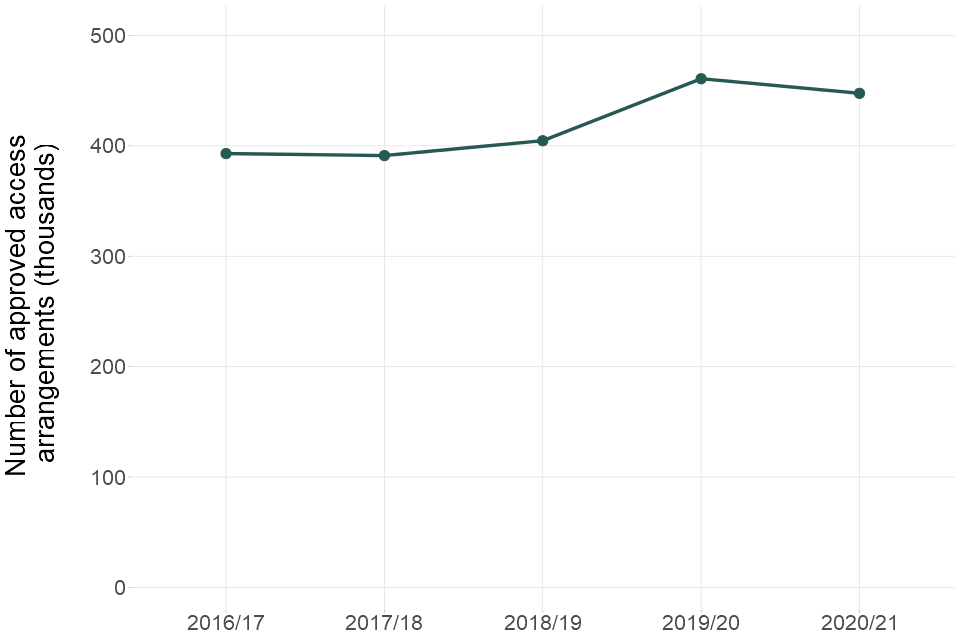
| Academic year | Number of approved access arrangements |
|---|---|
| 2016 to 2017 | 392,980 |
| 2017 to 2018 | 391,185 |
| 2018 to 2019 | 404,600 |
| 2019 to 2020 | 460,750 |
| 2020 to 2021 | 447,555 |
There were 447,555 approved access arrangements in the 2020 to 2021 academic year, down 2.9% compared to the 2019 to 2020 academic year. This was against the rise in the total number of candidates by 0.2% from 1,358,415 in the 2019 to 2020 academic year to 1,360,865 in the 2020 to 2021 academic year. The numbers of approved access arrangements decreased across all categories.
The decrease in the number of access arrangements this academic year could be due to the cancellation of the summer exams. The decision to cancel the summer exams and to instead award teacher assessed grades was announced before the deadline for submitting applications for access arrangements.
5,175 centres (88.2% of all centres) had approved access arrangements for one or more of their candidates this year, compared to 5,375 centres (91.1% of all centres) in the 2019 to 2020 academic year.
3. Most common types of access arrangements
3.1 Access arrangements changes over time
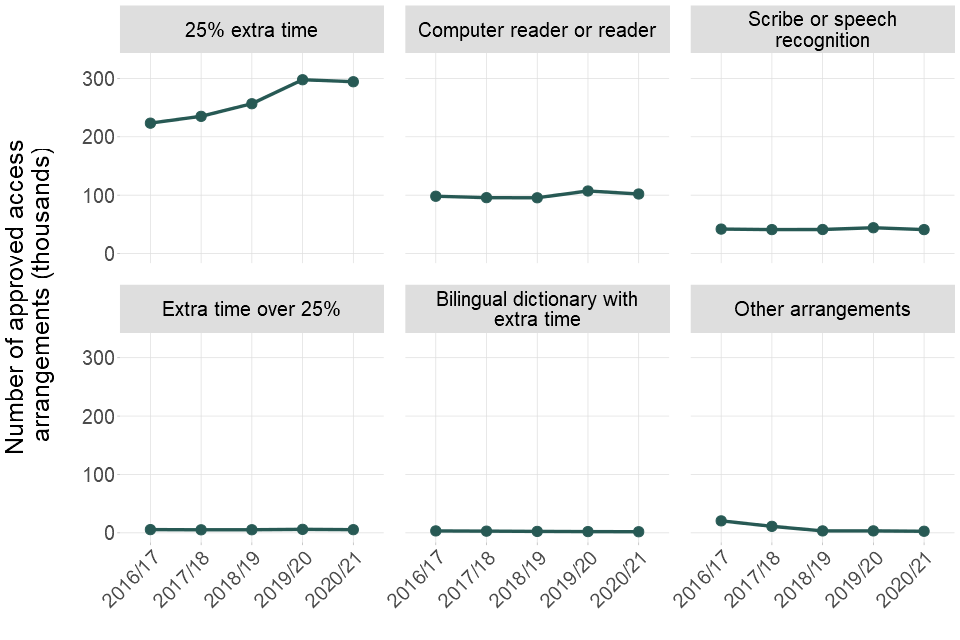
| Access Arrangement | 2016 to 2017 | 2017 to 2018 | 2018 to 2019 | 2019 to 2020 | 2020 to 2021 |
|---|---|---|---|---|---|
| 25% extra time | 223,425 | 235,105 | 256,710 | 297,810 | 294,370 |
| Computer reader or reader | 98,225 | 95,795 | 95,570 | 107,205 | 102,090 |
| Scribe or speech recognition | 41,965 | 41,075 | 41,255 | 44,255 | 41,070 |
| Extra time over 25% | 5,530 | 5,190 | 5,300 | 5,975 | 5,420 |
| Bilingual dictionary with extra time | 3,320 | 2,905 | 2,450 | 2,150 | 1,870 |
| Other arrangements | 20,525 | 11,115 | 3,315 | 3,355 | 2,735 |
| Total | 392,980 | 391,185 | 404,600 | 460,750 | 447,555 |
25% extra time, computer reader or reader and scribe or speech recognition were the most common access arrangements among all approved access arrangements.
There was a decrease in the numbers of all types of approved access arrangements in the 2020 to 2021 academic year, compared to the 2019 to 2020 academic year.
A further breakdown of ‘other arrangements’ is given in the data tables.
3.2 Proportions of all approved access arrangements
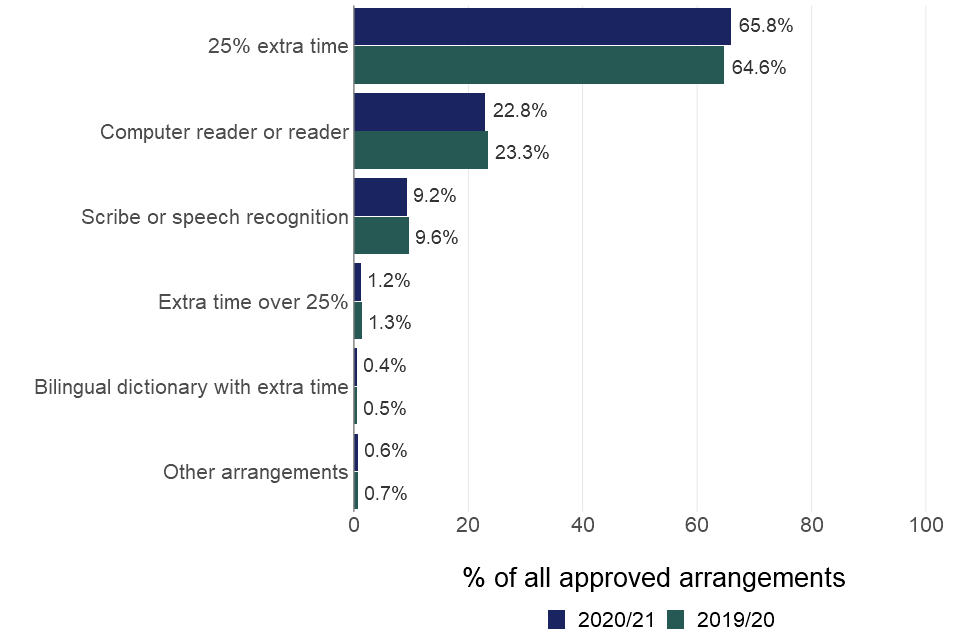
| Access arrangement | % of all approved arrangements in 2019 to 2020 | % of all approved arrangements in 2020 to 2021 |
|---|---|---|
| 25% extra time | 64.6% | 65.8% |
| Computer reader or reader | 23.3% | 22.8% |
| Scribe or speech recognition | 9.6% | 9.2% |
| Extra time over 25% | 1.3% | 1.2% |
| Bilingual dictionary with extra time | 0.5% | 0.4% |
| Other arrangements | 0.7% | 0.6% |
25% extra time access arrangements made up 65.8% of all approved access arrangements in the 2020 to 2021 academic year, compared to 64.6% in the 2019 to 2020 academic year.
Computer reader or reader access arrangements made up 22.8% of all approved access arrangements in the 2020 to 2021 academic year, compared to 23.3% in the 2019 to 2020 academic year.
Scribe or speech recognition access arrangements made up 9.2% of all approved access arrangements in the 2020 to 2021 academic year, compared to 9.6% in the 2019 to 2020 academic year.
Further information on all arrangements is given in the data tables.
3.3 Approved access arrangements as a proportion of candidates
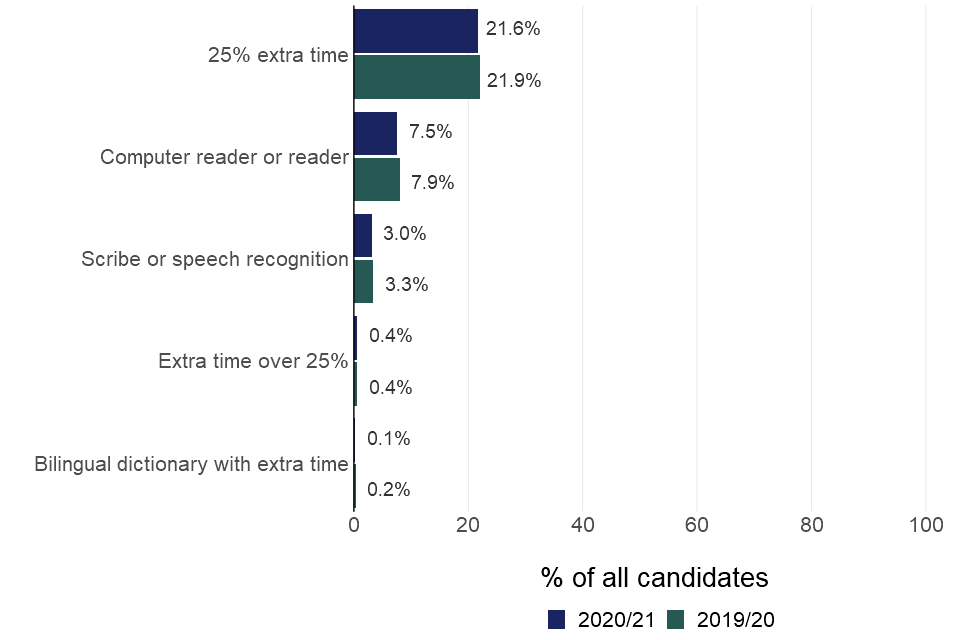
| Access arrangement | % of all candidates in 2019 to 2020 | % of all candidates in 2020 to 2021 |
|---|---|---|
| 25% extra time | 21.9% | 21.6% |
| Computer reader or reader | 7.9% | 7.5% |
| Scribe or speech recognition | 3.3% | 3.0% |
| Extra time over 25% | 0.4% | 0.4% |
| Bilingual dictionary with extra time | 0.2% | 0.1% |
25% extra time access arrangements were approved for 21.6% of all candidates taking exams (or receiving results) in the 2020 to 2021 academic year, compared to 21.9% in the 2019 to 2020 academic year.
Computer reader or reader access arrangements were approved for 7.5% of all candidates taking exams (or receiving results) in the 2020 to 2021 academic year, compared to 7.9% in the 2019 to 2020 academic year.
Scribe or speech recognition access arrangements were approved for 3.0% of all candidates taking exams (or receiving results) in the 2020 to 2021 academic year, compared to 3.3% in the 2019 to 2020 academic year.
Please note that more than one type of access arrangement can be granted per candidate. As we do not collect access arrangements data at candidate level, we are unable to calculate the percentage of candidates taking exams for ‘other arrangements’.
3.4 Proportions of all approved access arrangements by centre type
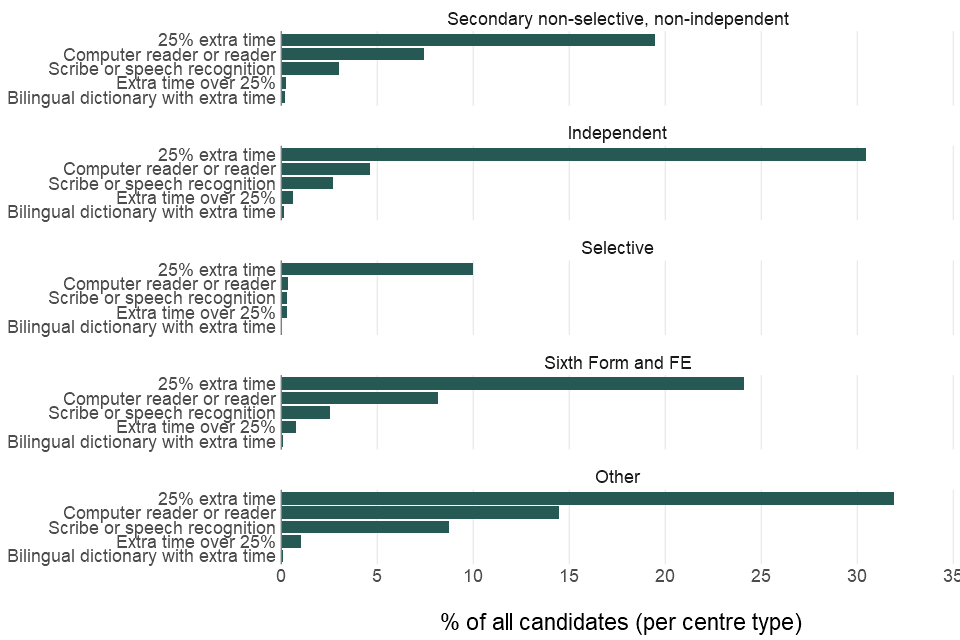
| Access arrangement | % of all candidates in Secondary non-selective, non-independent centres | % of all candidates in Independent centres | % of all candidates in Selective centres | % of all candidates in Sixth Form and FE centres | % of all candidates in Other centres |
|---|---|---|---|---|---|
| 25% extra time | 19.4% | 30.4% | 9.9% | 24.1% | 31.9% |
| Computer reader or reader | 7.4% | 4.6% | 0.3% | 8.1% | 14.5% |
| Scribe or speech recognition | 3.0% | 2.7% | 0.3% | 2.5% | 8.7% |
| Extra time over 25% | 0.2% | 0.6% | 0.3% | 0.7% | 1.0% |
| Bilingual dictionary with extra time | 0.2% | 0.1% | 0.0% | 0.1% | 0.0% |
The most common access arrangement approved in all centre types was 25% extra time (ranging from 9.9% of candidates in Selective centres to 31.9% of candidates in “Other” centres).
The second most common access arrangement for all centre types was Computer reader or reader (ranging from 0.3% of candidates in Selective centres to 14.5% of candidates in “Other” centres).
Scribe or speech recognition was the third most common access arrangement for all centre types (ranging from 0.3% of candidates in Selective centres to 8.7% of candidates in “Other” centres).
The “Other” centre type includes special schools, colleges of higher education, university departments, tutorial colleges, language schools, pupil referral units (PRU), HM Young Offender Institutes (HMYOI), HM Prisons, training centres, and unknown centre types.
Please note that an individual candidate can be granted more than one type of access arrangement, meaning that individual candidates may contribute to the figures for multiple arrangement types within a centre type. As we do not collect access arrangements data at candidate level, we are unable to calculate the percentage of candidates taking exams for ‘other arrangements’ across centre types.
4. Contextual information
In this report, Ofqual presents data on access arrangements approved for GCSE, AS and A level exams during the 2020 to 2021 academic year in England.
Access arrangements are the provisions made for students, agreed before they are assessed, to ensure that they can be validly assessed and are not unfairly disadvantaged due to a disability, temporary illness or injury or if their first language is not English. Any student with a disability (as defined by the Equality Act 2010 — ie who has a physical or mental impairment that has a substantial and long-term negative effect on their ability to do normal daily activities) is legally entitled to reasonable adjustments, which are a form of access arrangement. Access arrangements should not be confused with post-examination adjustments to the marks of students who have not been able to demonstrate their ability in an assessment due to exceptional circumstances, such as bereavement at the time of the assessment. These post-examination adjustments are covered in a separate report on special consideration. Please note that due to the cancellation of summer exams in 2020 and 2021, there is no 2020 or 2021 release of the special consideration report.
Any students entered for GCSE, AS or A levels who meet the exam boards’ eligibility criteria can have an access arrangement. Individual students may require more than one form of access arrangement. According to JCQ guidelines, once granted, an arrangement will apply for up to 26 months, although applications based on temporary conditions will last for one exam series only. In the 2020 to 2021 academic year, applications that had expired prior to, during or after the summer 2020 examination series were extended until the autumn 2020 examination series.
While other types of arrangement can be requested without needing the approval of exam boards, the data in this release only cover those arrangements which are granted through JCQ’s Access Arrangements Online system (detailed in JCQ guidelines).
In this release, all figures are rounded to the nearest 5 to ensure confidentiality of the data. Further information on this release is available in the background information as well as the data tables accompanying this report.
Figures for modified papers for 2021 are not presented in this release. No GCSE, AS and A level exams took place in summer 2021 due to the COVID-19 pandemic and therefore data on modified papers has not been collected.
5. User feedback
We welcome your feedback on our publications. Should you have any comments on this statistical release and how to improve it to meet your needs please contact us at [email protected].
Head of profession: Nadir Zanini

